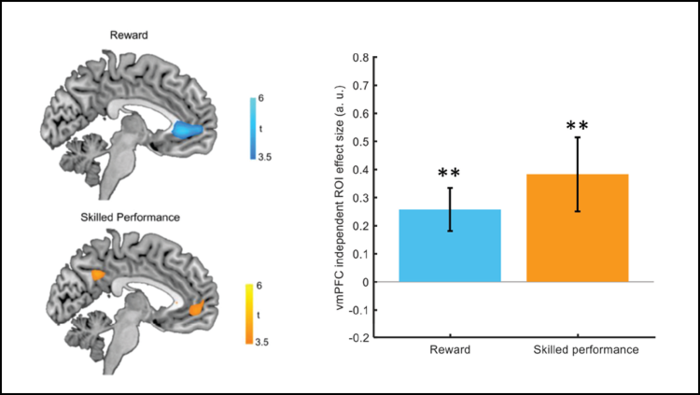People can struggle to accurately assess how they feel about something, especially something they feel social pressure to enjoy, like waking up early for a yoga class. How they really feel can be gleaned from their mood and their brain activity in reward regions, according to new research published in JNeurosci.

Credit: Chew, Blain et al., JNeurosci 2021
People can struggle to accurately assess how they feel about something, especially something they feel social pressure to enjoy, like waking up early for a yoga class. How they really feel can be gleaned from their mood and their brain activity in reward regions, according to new research published in JNeurosci.
Chew, Blain et al. measured participants’ mood with repeated questions and their brain activity with fMRI as they earned two types of rewards. Participants chose a box to earn points tied to how much money they would earn at the end of the task — an extrinsic reward. Then they played a game where they navigated a cursor through on-screen barriers. They did not earn anything for playing the game beyond their own satisfaction with doing well — an intrinsic reward. The participants answered questions about how they felt throughout the study.
The research team developed a mathematical equation to determine how much intrinsic and extrinsic rewards contributed to the participants’ mood in a particular moment. Most people felt happier after earning more points or successfully completing the game, but the contribution of either reward to happiness varied from person to person. People whose happiness was more swayed by intrinsic rewards had more activity in their ventromedial prefrontal cortex, a reward area, during intrinsic rewards compared to extrinsic rewards, and vice versa. These results provide a potential avenue to assess preferences without outright asking.
###
Paper title: A Neurocomputational Model for Intrinsic Reward
Please contact [email protected] for the full-text PDF and to join SfN’s journals media list.
About JNeurosci
JNeurosci, the Society for Neuroscience’s first journal, was launched in 1981 as a means to communicate the findings of the highest quality neuroscience research to the growing field. Today, the journal remains committed to publishing cutting-edge neuroscience that will have an immediate and lasting scientific impact, while responding to authors’ changing publishing needs, representing breadth of the field and diversity in authorship.
About The Society for Neuroscience
The Society for Neuroscience is the world’s largest organization of scientists and physicians devoted to understanding the brain and nervous system. The nonprofit organization, founded in 1969, now has nearly 37,000 members in more than 90 countries and over 130 chapters worldwide.
Journal
JNeurosci
DOI
10.1523/JNEUROSCI.0858-20.2021
Subject of Research
People
Article Title
A neurocomputational model for intrinsic reward
Article Publication Date
20-Sep-2021




